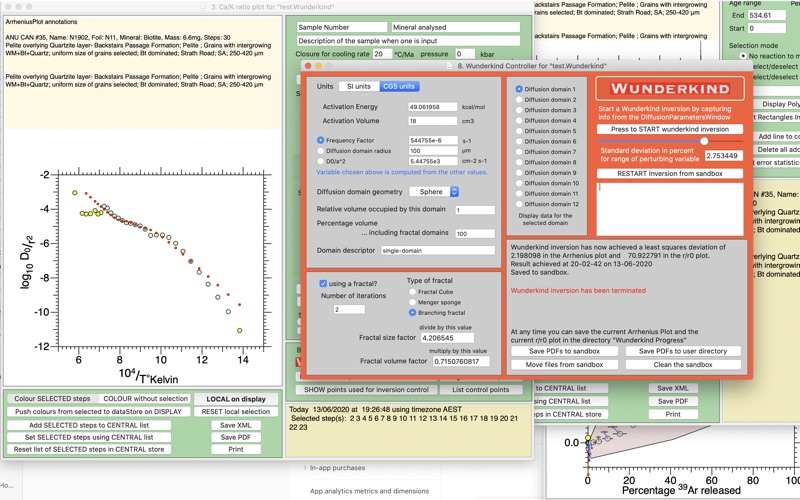Wunderkind
macOS / Education
Wunderkind is one of the family of three MacOS programs that can be used for the analysis of data from furnace step-heating ultra-high-vacuum diffusion experiments conducted in conjunction with argon geochronology. Data from the mass spectrometer is loaded in one of a number of XML-tagged data formats from different laboratories around the world, and processed using the eArgon program. Wunderkind allows conjoint inversion of that data to obtain the relevant diffusion parameters. Finally the output (in an XML format intended to become the industry standard) can be taken up by MacArgon, and used to forward model, or to perform a Monte Carlo inversion, in order to obtain pressure-temperature-time (P-T-t) histories that are capable of simulating the observed age spectra.
Wunderkind §2 uses multicore technology for inversion of data from ultra-high-vacuum temperature-controlled step-heating 39Ar diffusion experiments using Monte Carlo methods. A 'seed' estimate is provided, and then Wunderkind attempts to climb towards a better fit. These calculations can continue sometimes for many days in succession, intelligently monitoring the time between successful iterations, adjusting the range of scattering to suit. Plots of can be made showing the fractal dimensions of the inferred diffusion domains. The inversion process can be restarted from solutions stored previously in the sandbox.
Version §3 allows estimates as to the effect of prior loss of 39Ar, either during neutron irradiation in the reactor core, or during protracted warming to clean a sample of extraneous 40Ar. Interactive simulations allows the option to correct for the effect of this loss of 39Ar prior to measurement.
A correction can be made for the percentage of 39Ar lost prior to measurement (either by recoil during neutron irradiation, or during cleaning to rid the sample of unwanted gas in fast diffusion pathways). An XML tag records the state of the checkbox in the Arrhenius plot window, and the value of the assumed percentage recoil used to make the correction.
Quoi de neuf dans la dernière version ?
Version §5 upgrades Wunderkind to the MacOS Tahoe 26 operating system. MacOS Tahoe broke many elements of the graphical user interface, and these have been repaired. There have also been a number of improvements made to the optimisation routines, so scattering parameters in the Monte Carlo routines are dynamically maintained. Version §5.0.2 makes enforces the use of en_US_POSIX.



